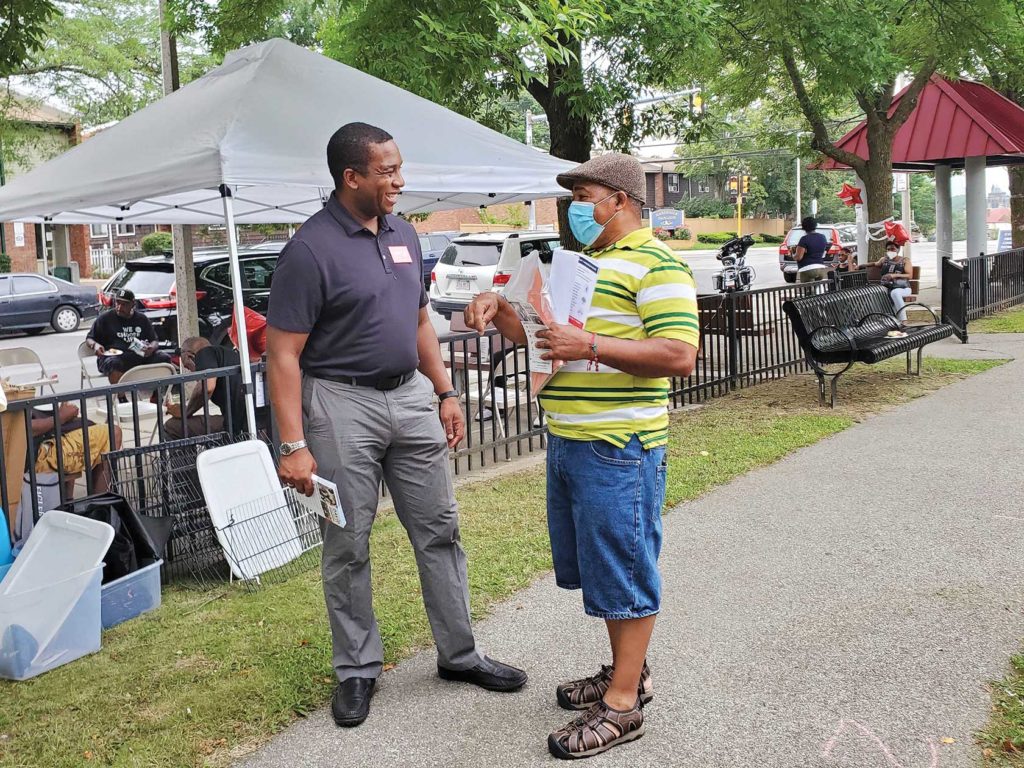Candidates race to raise cash with four weeks to go
Contributions are key to running serious campaign

With little more than four weeks left before the Sept. 14 preliminary election, campaigns for the City Council and the mayor’s office are in full swing. Or, they should be.
When it comes to marshalling dozens of volunteers, printing and distributing campaign literature and paying for staff, campaign cash is the oil that greases the electoral machine.
But within this year’s crop of City Council candidates, there’s wide variation in fundraising, with some candidates running with zeroed-out campaign accounts and others well into six figures.
In just five months, at-large candidate Ruthzee Louijeune has raised $253,199, standing out as the top fundraiser in the field. In the same race, David Halbert has raised more than $150,000 and has $85,000 on hand.
Others in the at-large race have had far more modest hauls. Said Abdikarim has raised $55,000 and Carla Monteiro, $42,261.
Halbert says a strong fundraising operation can give a campaign a competitive edge.
“Having more funds enables you to do more things,” he said. “It allows you to do communications. It allows you to pay campaign staff a living wage.”
Well-financed citywide campaigns often employ a campaign manager, a field director and a director of communications. The positions enable candidates to organize and mobilize dozens of volunteers that they will need to conduct door-to-door voter outreach, distribute campaign literature and turn supporters out to the polls on Election Day.
Former City Councilor Tito Jackson, who has run in at-large, district and mayoral races, says the amount candidates need to raise depends on the race and who else is in it.
“You see people win with anywhere from $50,000 to $150,000 and up,” he said.
Jackson won a special election for an open District 7 seat in 2011 after raising $125,000. Having paid staff gave him a critical edge over five other contenders in that race, he said. He sailed through the preliminary with more than two-thirds of the vote.
“Having funding gives you the ability to do outreach, get data in spreadsheets, conduct real field programs that allow you to reach people,” he said. “With paid staff, you have a level of accountability you don’t have with an all-volunteer staff.”
Six years later, when Kim Janey ran for the same seat, she raised more than $91,000 and topped a field of 13 in the preliminary. In the general election, she secured 55% of the vote over Rufus Faulk, who raised a more modest $19,000.
But in the current field of eight candidates for the District 7 seat, none has raised more than the $33,830 that former Uphams Corner Main Streets Director Tania Fernandes Anderson has collected. Anderson is trailed by Angelina Camacho, whose $26,464 haul includes $10,000 she loaned her campaign. Marisa Luse has raised $14,622, followed by Brandy Brooks, who has raised $4,400. Lorraine Payne Wheeler has raised $3,900, Santiago Rivera, $4,150, and Joao DePina, $3,405. Roy Owens hasn’t reported any contributions this year.
While all but Owens have raised enough to print out cards, many in the race will be distributing those cards door-to-door without the aid of paid staff.
But then, the winning candidate doesn’t have to beat a campaign financed like Jackson’s or Janey’s. They just have to beat the second-best campaign and use the money well.
“It’s not about raising the most money,” Halbert said. “It’s about raising the money you need to execute a good plan.”
In most district races, that means identifying voters who will support the candidate and making sure those same voters turn out and vote on Election Day. For that, candidates and their volunteers spend weeks knocking on the doors of voters who are not only registered to vote, but likely to vote. Campaigns typically pay upwards of $2,000 to obtain up-to-date lists that include voters who reliably cast ballots in municipal primaries — a small subset of the general voting population.
Without knowing who’s actually likely to vote in a preliminary vote, a candidate could waste time knocking doors of voters who generally turn out only in presidential election years, not during municipal elections.
In the end, the two candidates who make it past the preliminary election will be those who have targeted and turned out as few as 1,500 voters in September. That’s about what it took Janey to best a field of 13. It may be the same number for this year’s field of eight in District 7.
Just to the west of District 7, in the Jamaica Plain-West Roxbury District 6, two of three candidates have been raising money at a more frantic clip. Kendra Hicks has raised $130,585. Mary Tamer has raised $115,040. A third candidate, Winnie Eke, has raised a more modest $5,525. In the last preliminary special election for an open seat in that district, Matt O’Malley won with 3,830 votes.
While money isn’t everything in a race, a candidate’s ability to raise funds provides a measure of their organizational skills.
Endorsing organizations, such as unions and Democratic ward committees, often look to a candidate’s fundraising prowess as one of several measures they consider in throwing their support behind a candidate. In a June candidate forum for the District 4 race hosted by the Boston Teachers Union, the union barred candidates who had raised less than $10,000 from participating.
Jackson, too, sees fundraising as an indicator of a candidate’s commitment.
“It helps people understand that you’re a real candidate,” Jackson said. “This is serious business. The city budget is $3.6 billion, and the council has the responsibility to approve it or not approve it.”







